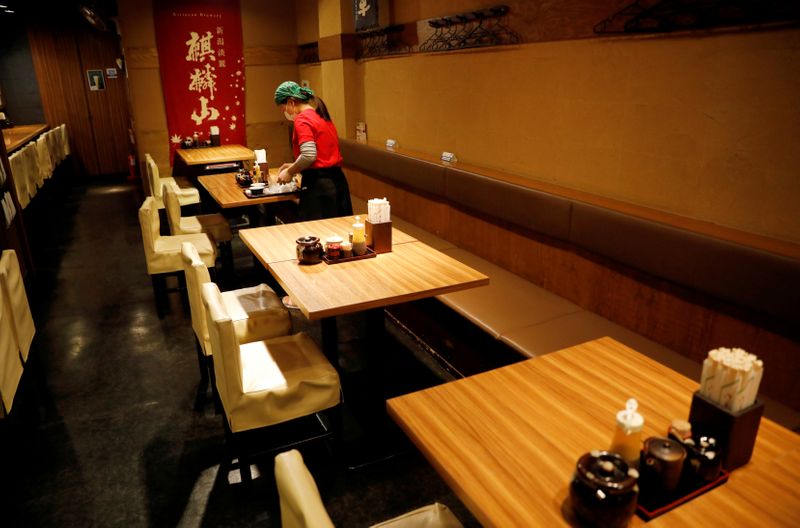By Daniel Leussink and Yoshifumi Takemoto
TOKYO (Reuters) - Japan's household spending fell at the fastest pace on record in May, as consumers heeded authorities' calls to stay home to contain the coronavirus pandemic, pushing the world's third-largest economy deeper into decline.
Wages and a gauge of economic activity also tanked in the month, keeping pressure on policymakers to revive business and consumer confidence.
Household spending slumped 16.2% in May from a year earlier, official data showed on Tuesday, falling at the quickest pace since comparable data became available in 2001.
The drop, which was larger than a median market forecast for a 12.2% fall, extended an 11.1% decline in April.
Separate data on Tuesday showed May inflation-adjusted real wages dropped at the fastest pace since June 2015, adding to signs of stress in the labour market.
Analysts expect any recovery in spending to be slow and fragile as households remain reluctant to loosen the purse strings even after a state of emergency was lifted in May.
"The pace of recovery is worrying," said Atsushi Takeda, chief economist at Itochu Economic Research Institute.
"Even though the government has rolled out policy measures, it's difficult for their impact to come out quickly."
MIXED PICTURE
Still, the Bank of Japan is expected to maintain its view in its quarterly report next week that the economy will gradually recover later this year.
Tuesday's data showed large cuts in spending on hotels, transportation and eating out. On the other hand, stay-home policies boosted spending on pork and beef, alcohol and sanitary goods like face masks and paper towels.
Last year's unprecedented 10-day Golden Week holiday to celebrate the enthronement of then-Crown Prince Naruhito made the drop in spending more pronounced, partly due to larger than usual spending on tourism in 2019, a government official said.
Policymakers hope a pickup in domestic demand will be strong enough to bring about an economic recovery, as long as Japan can avert a big second wave of coronavirus infections.
But the outlook for household spending is dim.
Japan's coincident indicator index, a gauge of the economy that includes factory output and employment, fell in May to the lowest level since 2009.
A separate BOJ survey showed Japanese households were the most pessimistic about the economy in more than a decade in the June quarter, underscoring the devastating impact the pandemic has had on consumption.
While the government compiled massive spending packages to cushion the blow from the pandemic, spending could take a larger hit if the worsening business outlook forces firms to slash workers' bonuses or lay off more workers.
"That, in turn, could cause income levels to drop further," said Takeshi Minami, chief economist at Norinchukin Research Institute.

"I think a phase of worsening consumption will strengthen in the second half of the year."